高中英语英语时态完整版
高中英语16种时态详细讲解

高中英语16种时态详细讲解1.一般现在时(do/does; is/am/are)①表示现在的情况、状态或特征。
例:He is a student.他是一个学生。
②表示经常性、习惯性动作。
例:He always helps others.他总是帮助别人。
③客观事实和普遍真理。
例:The earth moves the sun.地球绕着太阳转。
④表示一个按规定、计划或安排要发生的动作。
仅限于某些表示“来、去、动、停、开始、结束、继续”等的动词,可以与表示未来时间的状语搭配使用。
常见的用法是:飞机、火车、轮船、汽车等定期定点运行的交通方式。
例:The next train leaves at 3 o'clock this afternoon.下一趟火车今天下午3点开车。
⑤在时间、条件和让步状语从句中经常用一般现在(有时也用现在完成时)表示将的来事情。
(即:主将从现原则)例:I will call you as soon as I arrive at the airport.我一到机场就会给你打电话。
When you have finished the report, I will have waited for about 3 hours. 等你完成这份报告的时候,我就已经等了将近3个小时了。
2. 现在进行时(am/is/are doing)①表示此时此刻正在发生的事情。
例:He is listning to the music now.他现在正在听音乐。
②表示目前一段时间内一直在做的事情,但不一定此时此刻正在做。
例:I am studying computer this term.这个学期我一直在学习计算机。
③现在进行时可以表示将来的含义。
a. 瞬时动词的进行一定表将来。
例:I am leaving.我要离开了。
b. 持续动词的进行只有有将来的时间状语或有将来语境中才表将来。
例:I am travelling next month.下个月我要去旅行。
高中英语高考复习时态详细讲解(共16类)
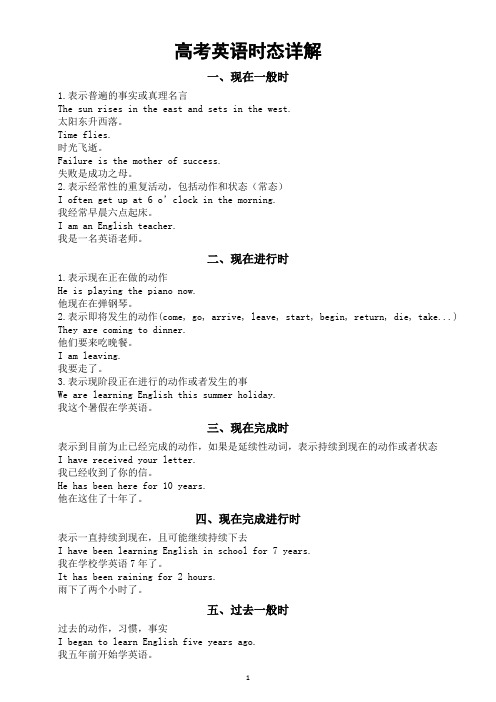
高考英语时态详解一、现在一般时1.表示普遍的事实或真理名言The sun rises in the east and sets in the west.太阳东升西落。
Time flies.时光飞逝。
Failure is the mother of success.失败是成功之母。
2.表示经常性的重复活动,包括动作和状态(常态)I often get up at 6 o’clock in the morning.我经常早晨六点起床。
I am an English teacher.我是一名英语老师。
二、现在进行时1.表示现在正在做的动作He is playing the piano now.他现在在弹钢琴。
2.表示即将发生的动作(come, go, arrive, leave, start, begin, return, die, take...) They are coming to dinner.他们要来吃晚餐。
I am leaving.我要走了。
3.表示现阶段正在进行的动作或者发生的事We are learning English this summer holiday.我这个暑假在学英语。
三、现在完成时表示到目前为止已经完成的动作,如果是延续性动词,表示持续到现在的动作或者状态I have received your letter.我已经收到了你的信。
He has been here for 10 years.他在这住了十年了。
四、现在完成进行时表示一直持续到现在,且可能继续持续下去I have been learning English in school for 7 years.我在学校学英语7年了。
It has been raining for 2 hours.雨下了两个小时了。
五、过去一般时过去的动作,习惯,事实I began to learn English five years ago.我五年前开始学英语。
(完整版)高中语法之常用时态语态详解

第四章时态和语态一.动词的时态英语时态用共有十六种时态,其中常用的有8种,它们是:一般现在时、一般过去时、一般将来时、现在进行时、现在完成时、过去进行时、过去完成时和过去将来时。
一. 一般现在时.1.构成. be动词:am is are ; 其他动词用动词原形,当主语是第三人称单数时要在谓语动词后加“s”,其变化规则与名词变复数一致。
2.用法. 1). 经常性或习惯性的动作,常与表示频度的时间状语连用。
如usually, always, often, seldom, never, every...,eg. I leave home for school at 7 every morning.I don’t leave home for school at 7 every morning.Do I leave home for school at 7 every morning?He usually gets up early.He doesn’t usually get up early.Does he usually get up early?2) 客观真理,客观存在,科学事实。
eg. The earth moves around the sun.The earth doesn’t move around the sun 否定句Does the earth move around the sun? 疑问句Shanghai lies in the east of China.Shanghai doesn’t lie in the east of China 否定句Does Shanghai lie in the east of China? 疑问句Water boils at 100 centigrade degrees.3) 表示格言或警句中eg. Pride goes before a fall.注意. 此用法如果出现在宾语从句中,即使主句是过去时,从句谓语也要用一般现在时。
关于高中英语的十六种英语时态详细解析

关于高中英语的十六种英语时态详细解析1.一般现在时 do/does; is/am/are① 表示现在的情况、状态或特征。
例:He is a student.他是一个学生。
② 表示经常性、习惯性动作。
例:He always helps others.他总是帮助别人。
③ 客观事实和普遍真理。
例:The earth moves the sun.地球绕着太阳转。
④ 表示一个按规定、计划或安排要发生的动作。
仅限于某些表示“来、去、动、停、开始、结束、继续”等的动词,可以与表示未来时间的状语搭配使用。
常见的用法是:飞机、火车、轮船、汽车等定期定点运行的交通方式。
例:The next train leaves at 3 o'clock this afternoon.下一趟火车今天下午3点开车。
⑤ 在时间、条件和让步状语从句中经常用一般现在有时也用现在完成时表示将的来事情。
即:主将从现原则例:I will call you as soon as I arrive at the airport.我一到机场就会给你打电话。
When you have finished the report, I will have waited for about 3 hours.等你完成这份报告的时候,我就已经等了将近3个小时了。
2. 现在进行时am/is/are doing① 表示此时此刻正在发生的事情。
例:He is listning to the music now.他现在正在听音乐。
② 表示目前一段时间内一直在做的事情,但不一定此时此刻正在做。
例:I am studying computer this term.这个学期我一直在学习计算机。
③ 现在进行时可以表示将来的含义。
a. 瞬时动词的进行一定表将来。
例: I am leaving.我要离开了。
b. 持续动词的进行只有有将来的时间状语或有将来语境中才表将来。
例: I am travelling next month.下个月我要去旅行。
高中英语十大时态

高中英语十大时态《高中英语十大时态》一、一般现在时1. 用法- 表示经常或习惯性的动作或状态。
例如:I often go to school by bike.(我经常骑自行车去上学。
)- 表示客观事实、真理等。
例如:The earth moves around the sun.(地球绕着太阳转。
)- 在时间、条件等状语从句中,用一般现在时表示将来。
例如:If it rains tomorrow, we will stay at home.(如果明天下雨,我们就待在家里。
)2. 英语解释:We use the simple present tense to talk about things that happen regularly or are always true. For actions or situations that are repeated, like daily routines. And for general facts and truths that don't change. Also, in some adverbial clauses of time and condition, it can be used to refer to the future.3. 10个例子及翻译- He plays football every Sunday.(他每个星期天踢足球。
)- She likes reading books.(她喜欢读书。
)- My mother gets up at six o'clock every day.(我妈妈每天六点起床。
)- The shop closes at nine in the evening.(这家商店晚上九点关门。
)- Water boils at 100 degrees Celsius.(水在100摄氏度沸腾。
)- I'll call you as soon as I arrive home.(我一到家就给你打电话。
高中英语动词时态完整版

Unit 1 Body Language Grammar: Review of tenses时态概念:英语中作谓语的动词用来表示该动作在不同的时间里发生或存在的状态的各种形式。
英语总共又16种时态,中学英语主要又9种时态。
以动词Work 为例时态用法:1.一般现在时态用法一般现在时态练习题:2.一般过去时态的用法:一般过去时态练习题:3.一般将来时态的用法:一般将来时态表示法:1)Shall / will + do 表示不含主观因素,单纯表示将来。
My birthday is coming, I shall be 19 years old.2)be going to do 表示计划安排好的动作。
或根据目前的情况判断某事即将发生,意为“将要,就要”。
Look at the black clouds. It is going to rain.He is going to swim this afternoon.3)be to do 表示“正式安排”要在将来做的事,意为“预定”,常用于通知,规定,正式的命令或指示。
The meeting is to be held on Friday morning.The president is to hold an official reception for the visitors.4)be about to do 表示即刻就要发生的动作。
后面一般不接将来时间状语。
I was about to go out, when the telephone rang.Come on , the check-in desk I about to close.5) 一些瞬间动词的一般现在时,现在进行时或将来进行时可表示计划或将要发生的动作。
常用的动词有 go , come, strat, arrive, return, begin, leave, sail, move.Our summer holiday begins in three days.The professor is giving a talk this afternoon.6) be due to +动词原形,表示“定于(某时做某事)常与时间状语连用。
(完整版)(完整版)高中英语时态讲解

表示以过去某一时间为参照,在过去看将要发生的动 作或存在的状态。常用于宾语从句和间接引语 。
The boy promised he would work hard. I told my parents I shold return early.
其他表示过去将来的句型
was (were) going to
I have had that book for six days √
I have borrowed(瞬时性动词) this book for seven
days(时间段)
×
borrow(v.)(瞬时性动词)→keep(v.)(延续性动词)
I have kept this book for seven days √
2)be about to do… 表示眼下马上就要发生的动作 He is about to leave for Beijing. 他马上要去北京。
3) be +to do… 表示计划中约定的必须将发生的行为; 按职责义务必须去做的事情/要发生的动作 You’re to deliver these flowers before 10. 你在10点钟之前把这些花送去。 4)be+doing 主要用于go, come, leave, start等表示去向的短暂性动 词。 I’m leaving tomorrow. 明天我要走了。
(时间段)
×
open(v.)(瞬时性动词)→open(adj.)(状态)
This shop has been open for five days. √
I have bought(瞬时性动词) that book for six days
(时间段)
(完整)高中英语语法(时态和语态)
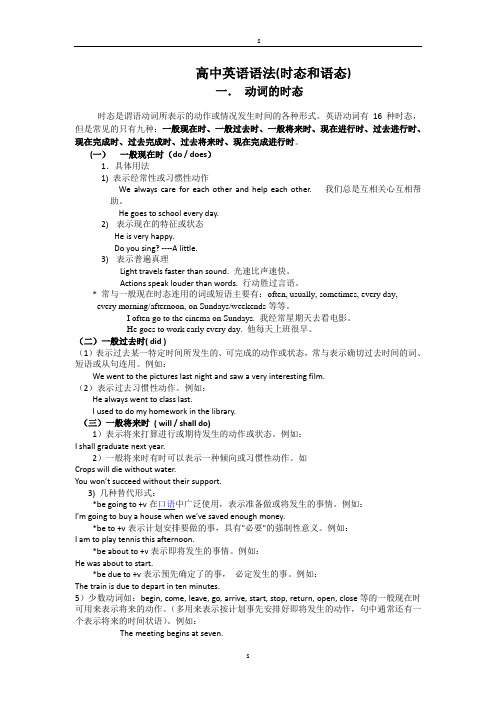
高中英语语法(时态和语态)一.动词的时态时态是谓语动词所表示的动作或情况发生时间的各种形式。
英语动词有16种时态,但是常见的只有九种:一般现在时、一般过去时、一般将来时、现在进行时、过去进行时、现在完成时、过去完成时、过去将来时、现在完成进行时。
(一)一般现在时(do / does)1.具体用法1) 表示经常性或习惯性动作We always care for each other and help each other. 我们总是互相关心互相帮助。
He goes to school every day.2)表示现在的特征或状态He is very happy.Do you sing? ----A little.3)表示普遍真理Light travels faster than sound. 光速比声速快。
Actions speak louder than words. 行动胜过言语。
* 常与一般现在时态连用的词或短语主要有:often, usually, sometimes, every day,every morning/afternoon, on Sundays/weekends等等。
I often go to the cinema on Sundays. 我经常星期天去看电影。
He goes to work early every day. 他每天上班很早。
(二)一般过去时( did )(1)表示过去某一特定时间所发生的、可完成的动作或状态,常与表示确切过去时间的词、短语或从句连用。
例如:We went to the pictures last night and saw a very interesting film.(2)表示过去习惯性动作。
例如:He always went to class last.I used to do my homework in the library.(三)一般将来时( will / shall do)1)表示将来打算进行或期待发生的动作或状态。
高中英语时态
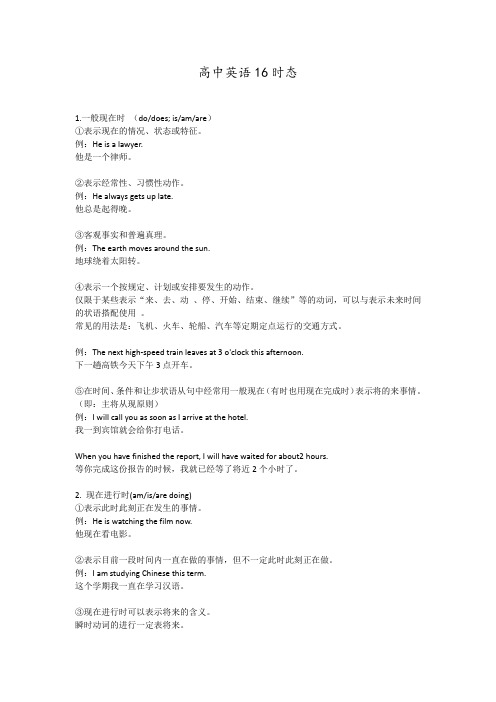
高中英语16时态1.一般现在时(do/does; is/am/are)①表示现在的情况、状态或特征。
例:He is a lawyer.他是一个律师。
②表示经常性、习惯性动作。
例:He always gets up late.他总是起得晚。
③客观事实和普遍真理。
例:The earth moves around the sun.地球绕着太阳转。
④表示一个按规定、计划或安排要发生的动作。
仅限于某些表示“来、去、动、停、开始、结束、继续”等的动词,可以与表示未来时间的状语搭配使用。
常见的用法是:飞机、火车、轮船、汽车等定期定点运行的交通方式。
例:The next high-speed train leaves at 3 o'clock this afternoon.下一趟高铁今天下午3点开车。
⑤在时间、条件和让步状语从句中经常用一般现在(有时也用现在完成时)表示将的来事情。
(即:主将从现原则)例:I will call you as soon as I arrive at the hotel.我一到宾馆就会给你打电话。
When you have finished the report, I will have waited for about2 hours.等你完成这份报告的时候,我就已经等了将近2个小时了。
2. 现在进行时(am/is/are doing)①表示此时此刻正在发生的事情。
例:He is watching the film now.他现在看电影。
②表示目前一段时间内一直在做的事情,但不一定此时此刻正在做。
例:I am studying Chinese this term.这个学期我一直在学习汉语。
③现在进行时可以表示将来的含义。
瞬时动词的进行一定表将来。
例: I am coming.我就来。
持续动词的进行只有有将来的时间状语或有将来语境中才表将来。
例: I am leaving next month.下个月我要离开。
高中英语16种时态用法讲解(附例句)

高中英语16种时态用法讲解(附例句)1. 一般现在时 simple present tense用法:A) 表示现在发生的动作、情况、状态和特征【例】My father is not home yet. 我父亲还没回家.She is a student. 她是一个学生。
B) 经常性、习惯性动作,常与表示频度的副词连用,如always,often,seldom等【例】He always eats an apple in the morning. 他常常在早上吃一个苹果。
C) 表示客观事实和普遍真理The earth moves around the sun. 地球绕太阳转动。
D) 表示按计划安排好的,或将要发生的动作,可用一般现在表将来,但仅限于start, leave, go, arrive, begin等单词【例】The train leaves at 3:00 p.m.. 火车三点发车。
The show begins in half an hour. 半小时后演出开始。
E) 在时间和条件状语从句中,主句是将来时,从句通常用一般现在(有时也用现在完成时)表示将来事情【例】I will go to bed when he comes back. 等他回来了我就去睡觉。
If you don't stop the yelling, I will leave right now. 如果你还继续大吼大叫的话,我现在就走。
2. 现在进行时 present progressive tense用法:A) 表示说话时正在进行的动作【例】They are having lunch. 他们在吃饭。
B) 表示现阶段正在进行的动作【例】We are looking for a new house. 我们现在在找新房子。
3. 现在完成时 present perfect tense用法:A) 表示动作到现在为止已经完成或刚刚完成【例】I have just finished my homework. 我刚刚才写完作业。
高中英语英语时态完整版

• 写出下列动词在句中的适当形式:
1)We ____lo_v__e____ (love) sports. 2)She ____s_i_n_g_s___ (sing) well. 3)Tom and John ______w_a_t_c_h_ (watch) TV
every evening. 4)My son _____g_o_e_s___ (go) to school by bike. 5)Their teacher usually ________w_a_l_k(swalk) to
( B )3. The twins(双胞胎)_____in Dalian last year. They_____here now.
A. are; were
B. were; are
C. was; are
D. were; was
( A )4.____your father at work the day_____yesterday﹖
上述两个例句中的宾语从句谓语 would win 和 should(would)be 分别与其主句谓语 were sure 和 didn't expect 相对应。
三、过去将来时的一些其它表达形式:
1.was/were+going to+动词原形 He said he was going to try. 他说他准备试试。 2.was/were+to+动词原形 They said the railway was to be opened to traffic on May Day. 他们说这条铁路将在五一节通车。 3.was/were about+动词原形 We were about to go out when it began to rain. 我们正要出去天(突然)下起雨来。 4.过去进行时(一般多为动作概念较强的动词,如 go,come, leave,start, open,begin 等)也可用于表示将来。 I didn't know when they were coming again. 我不知道他们什么时候再来。
高中英语英语时态完整版

二、一般过去时 ——过去动作、过去习惯、过去状态
二、基本形式:
would/should+动词原形 (其中 would 用于各种人称, should 常用于第一人称)。 例如: They were sure they would win the final victory. 他们坚信会赢得最后胜利。 He didn't expect that we should(would)all be there. 他没想到我们都在那里。
A. spent
B. would spent
C. was going to spent D. would spend
2. —What did your son say in the letter?
will do 将要发生、意志决心、临时
一般将来时
决定、总是发生
am/is/are going to do
事前做出的安排或打算;迹象
表明要发生
三、一般将来时
1) shall用于第一人称,常被will 所代替。 will 在陈述句中用于各人称,在征求意见时常用于第二人称。 Which paragraph shall I read first? Will you be at home at seven this evening? 2) be going to +不定式,表示将来。
练一练:
Practice
高中三年16种英语时态

高中三年16种英语时态英语是全球通用的语言,掌握好英语的时态对于阅读、听力、口语及写作都有很大的帮助,同时也是考试中必不可少的一项内容。
高中学习中共有16种英语时态,本文将对这16种时态简要介绍,希望能帮助读者更深入理解其用法和语法规则。
一、一般现在时一般现在时表示一个习惯性的动作或者一个行动状态。
主语+ 动词原形(+ 其他)例如:I read a book every day.(我每天都会阅读一本书。
)二、一般过去时一般过去时表示过去某个时间发生的动作,或描述过去某段时间的状态。
主语+ 动词过去式(+ 其他)例如:I played soccer yesterday.(昨天我踢了一场足球。
)三、一般将来时一般将来时表示一个将要发生的动作或事件。
主语+ will + 动词原形(+ 其他)例如:I will go to China next month.(我下个月要去中国。
)四、现在进行时现在进行时表示正在进行的动作或者状态,也可以表示未来的计划。
主语+ am/is/are + 现在分词(+ 其他)例如:He is watching TV right now.(他正在看电视。
)五、过去进行时过去进行时表示过去某个时间正在进行的动作或状态,并且该动作是发生在过去某一时刻的。
主语+ was/were + 现在分词(+ 其他)例如:I was studying in the library at six p.m. yesterday.(昨天下午6点我正在图书馆学习。
)六、将来进行时将来进行时表示某个将来某个时间正在进行的动作或状态。
主语+ will be + 现在分词(+ 其他)例如:We will be having dinner at six p.m. tomorrow.(明天晚上六点我们正在吃饭。
)七、过去完成时过去完成时表示过去的某个时间之前已经完成的动作。
主语+ had + 过去分词(+ 其他)例如:We had finished our homework when our parents came back.(我们父母回来时我们已经完成了家庭作业。
高中英语考试时态总结(16种详解)

7
例:Mary was listening to light music 10 minutes ago. 10 分钟前,玛丽正在听轻音乐。 ② 表示过去某个时间段内一直在发生的事情。
例:I was travelling in London last summer vacation. 去年暑假我在伦敦旅行。
13. 过去完成进行时: had been doing
表示某一动作一直延续到过去某一时间,是否继续下去, 应视上下文而定。
12
例:The old clock had been being taken apart of and fixed up again for several times by my 10-year old son before I came back home. 我回到家之前, 我 10 岁大的儿子已经把这个旧钟表拆卸并 重新组装了好几回了。
③ 现在进行时可以表示将来的含义。
a. 瞬时动词的进行一定表将来。
例: I am leaving. 我要离开了。
3
b. 持续动词的进行只有有将来的时间状语或有将来语境 中才表将来。
例: I am travelling next month. 下个月我要去旅行。
④ 现在进行时与频度副词连用, 表示说话者或褒义或贬义的感情 色彩。
6
6. 过去完成时 (had done)
表示在过去的某个时间或动作以前已经发生的动作或已经 存在的状态。就是我们常说的"过去的过去"。
Until then, his family hadn't heard from him for six months. 到那时为止,他家里已经有六个月没得到他的消息了。
关于高中英语的十六种英语时态详细解析
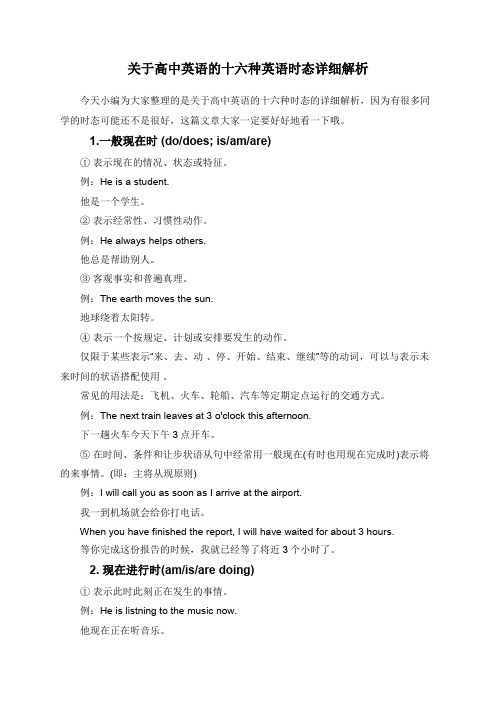
关于高中英语的十六种英语时态详细解析今天小编为大家整理的是关于高中英语的十六种时态的详细解析,因为有很多同学的时态可能还不是很好,这篇文章大家一定要好好地看一下哦。
1.一般现在时 (do/does; is/am/are)①表示现在的情况、状态或特征。
例:He is a student.他是一个学生。
②表示经常性、习惯性动作。
例:He always helps others.他总是帮助别人。
③客观事实和普遍真理。
例:The earth moves the sun.地球绕着太阳转。
④表示一个按规定、计划或安排要发生的动作。
仅限于某些表示“来、去、动、停、开始、结束、继续”等的动词,可以与表示未来时间的状语搭配使用。
常见的用法是:飞机、火车、轮船、汽车等定期定点运行的交通方式。
例:The next train leaves at 3 o'clock this afternoon.下一趟火车今天下午3点开车。
⑤在时间、条件和让步状语从句中经常用一般现在(有时也用现在完成时)表示将的来事情。
(即:主将从现原则)例:I will call you as soon as I arrive at the airport.我一到机场就会给你打电话。
When you have finished the report, I will have waited for about 3 hours.等你完成这份报告的时候,我就已经等了将近3个小时了。
2. 现在进行时(am/is/are doing)①表示此时此刻正在发生的事情。
例:He is listning to the music now.他现在正在听音乐。
②表示目前一段时间内一直在做的事情,但不一定此时此刻正在做。
例:I am studying computer this term.这个学期我一直在学习计算机。
③现在进行时可以表示将来的含义。
a. 瞬时动词的进行一定表将来。
高中英语16种时态表格
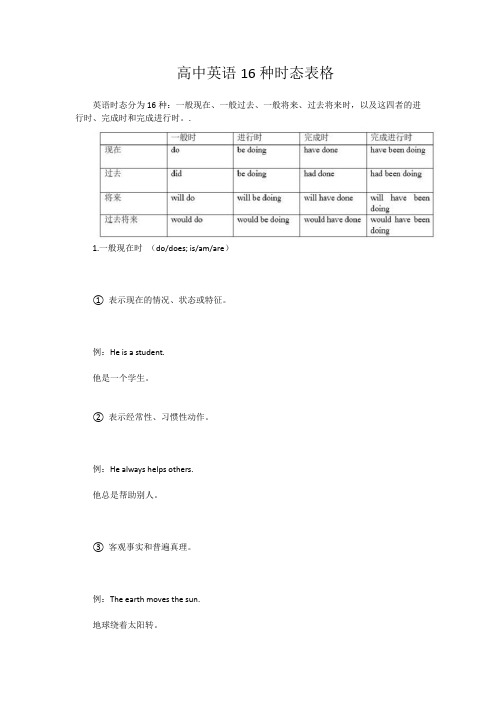
高中英语16种时态表格英语时态分为16种:一般现在、一般过去、一般将来、过去将来时,以及这四者的进行时、完成时和完成进行时。
.1.一般现在时(do/does; is/am/are)① 表示现在的情况、状态或特征。
例:He is a student.他是一个学生。
② 表示经常性、习惯性动作。
例:He always helps others.他总是帮助别人。
③ 客观事实和普遍真理。
例:The earth moves the sun.地球绕着太阳转。
④ 表示一个按规定、计划或安排要发生的动作。
仅限于某些表示“来、去、动、停、开始、结束、继续”等的动词,可以与表示未来时间的状语搭配使用。
常见的用法是:飞机、火车、轮船、汽车等定期定点运行的交通方式。
例:The next train leaves at 3 o'clock this afternoon.下一趟火车今天下午3点开车。
⑤在时间、条件和让步状语从句中经常用一般现在(有时也用现在完成时)表示将来的事情。
(即:主将从现原则)例:I will call you as soon as I arrive at the airport.我一到机场就会给你打电话。
When you have finished the report, I will have waited for about 3 hours.等你完成这份报告的时候,我就已经等了将近3个小时了。
2. 现在进行时(am/is/are doing)①表示此时此刻正在发生的事情。
例:He is listning to the music now.他现在正在听音乐。
②表示目前一段时间内一直在做的事情,但不一定此时此刻正在做。
例:I am studying computer this term.这个学期我一直在学习计算机。
③现在进行时可以表示将来的含义。
瞬时动词的进行一定表将来。
例:I am leaving.我要离开了。
高中英语16种英语时态讲解(共43张PPT)
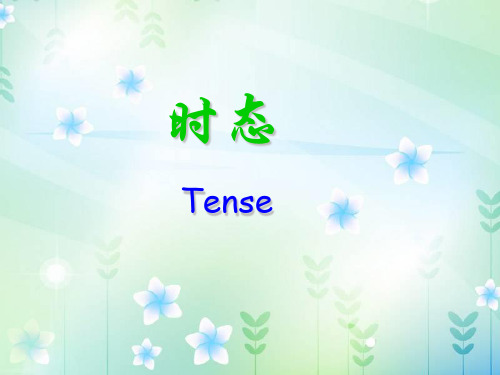
• Someone is knocking at the door. I’ll go and open it.
8
五、现在进行时态
现在进行时的基本用法
形式: am/is/are + doing
现在进行时的基本用法
用法3: 表示最近的将来一定的安排. 通常含有“计划”, “安排做”之意.
• I am taking a makeup test tomorrow. • — what are you doing on Saturday night?
— I’m doing some shopping with Jane. 用法4: 常与always, forever, continually, constantly 等连用,表示抱怨,厌烦, 不合情理或使人不愉快的事.
一般现在时的基本用法
形式:
do 或does(第三人 称单数)
用法1: 表示经常发生的习惯性的动作或者存在的状态.
• He often goes to the gym.
• I like the rice for dinner.
• He doesn’t work hand.
此用法常与一些表示动作频率的时间副词连用(副词放在be动词之 后, 实义动词之前).
3
二、一般现在时态
一般现在时的基本用法
用法2: 表示不受时间限制的事实陈述或客观性的真理. • The earth moves around the sun. • The sun rises in the east and sets in the west. • Knowledge is power.
高中英语八大时态
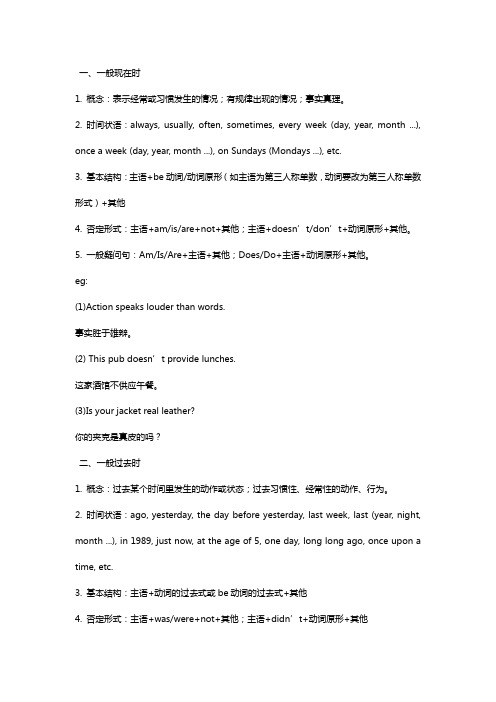
一、一般现在时1. 概念:表示经常或习惯发生的情况;有规律出现的情况;事实真理。
2. 时间状语:always, usually, often, sometimes, every week (day, year, month ...), once a week (day, year, month ...), on Sundays (Mondays ...), etc.3. 基本结构:主语+be动词/动词原形(如主语为第三人称单数,动词要改为第三人称单数形式)+其他4. 否定形式:主语+am/is/are+not+其他;主语+doesn’t/don’t+动词原形+其他。
5. 一般疑问句:Am/Is/Are+主语+其他;Does/Do+主语+动词原形+其他。
eg:(1)Action speaks louder than words.事实胜于雄辩。
(2) This pub doesn’t provide lunches.这家酒馆不供应午餐。
(3)Is your jacket real leather?你的夹克是真皮的吗?二、一般过去时1. 概念:过去某个时间里发生的动作或状态;过去习惯性、经常性的动作、行为。
2. 时间状语:ago, yesterday, the day before yesterday, last week, last (year, night, month ...), in 1989, just now, at the age of 5, one day, long long ago, once upon a time, etc.3. 基本结构:主语+动词的过去式或be动词的过去式+其他4. 否定形式:主语+was/were+not+其他;主语+didn’t+动词原形+其他5. 一般疑问句:Was/were+主语+其他;Did+主语+动词原形+其他eg:(1)She often came to help us in those days.那些天她经常来帮助我们。
- 1、下载文档前请自行甄别文档内容的完整性,平台不提供额外的编辑、内容补充、找答案等附加服务。
- 2、"仅部分预览"的文档,不可在线预览部分如存在完整性等问题,可反馈申请退款(可完整预览的文档不适用该条件!)。
- 3、如文档侵犯您的权益,请联系客服反馈,我们会尽快为您处理(人工客服工作时间:9:00-18:30)。
一、一般现在时
一直以来的习惯动作;目前状态;规律
一般现在时
单三人称:动词 s或es 非单三人称:动词原形
动词第三人称单数的变化规则
1、直接在动词后+s
like- likes
play-plays
2、以s, x, sh, ch, 接尾的动词:+es
wash-washes
3、以辅音+o接尾的动词:+es
• 写出下列动词在句中的适当形式:
1)We ____lo_v__e____ (love) sports. 2)She ____s_i_n_g_s___ (sing) well. 3)Tom and John ______w_a_t_c_h_ (watch) TV
every evening. 4)My son _____g_o_e_s___ (go) to school by bike. 5)Their teacher usually ________w_a_ls
4、以辅音+y接尾的动词:变y为i+es
fly-flies
一、一般现在时的用法
1) 经常性或习惯性的动作,常与表示频度的时间状 语everyday, often, always, once a week, seldom, usually等连用。
I leave home for school at 7 every morning. He cycles to work every day. 2) 客观真理,客观存在,科学事实。 The earth moves around the sun. Shanghai lies in the east of China. Water boils at 100 centigrade degrees.
school. 6)Five plus two ______m_a_k__e_s(make) seven. 7)They all ______li_k_e___ (like) him. 8)The sun ______fa_l_l_s__ (fall) in the west.
二、一般过去时 ——过去动作、过去习惯、过去状态
will do 将要发生、意志决心、临时
一般将来时
决定、总是发生
am/is/are going to do
1982等。 I saw Tom in the street yesterday. I bought this TV set in Beijing last year.
2)表示在过去一段时间内,经常性或习惯性的动作。 When I was a child, I often played football in the street. He always went to work by bus.
动词过去式的变化(规则动词)
▪ 以重读闭音节结尾的,则双写
plan → planned e.g. We planned to go to the party.
▪ 以辅音字母 y 结尾,去 y 变 i 加 ed。 如 try → tried; study → studied e.g. He tried to climb the tree, but he could not.
( B )3. The twins(双胞胎)_____in Dalian last year. They_____here now.
A. are; were
B. were; are
C. was; are
D. were; was
( A )4.____your father at work the day_____yesterday﹖
A. Was; before
B. Is; before
C. Was; after
D. Is; after
( B )5. —Who was on duty(值日) last Friday﹖ —_______.
A. I am
B. I was
C. Yes, I was
D. No, I wasn't
三、一般将来时
一、单项选择:
( C )1. My father_______ill(生病的) yesterday.
A. isn‘t B. aren’t C. wasn‘t D. weren’t
( D )2. _______your parents at home last week﹖
A. Is B. Was C. Are D. Were
一般过去时
动词过去式的变化(规则动词)
▪ 一般在词尾加 ed ask → asked; help → helped e.g. They asked me the time just now.
▪ 以 e 结尾直接加 d arrive → arrived e.g. I arrived late this morning.
动词过去式的变化(不规则动词)
例: go → went drink → drank eat → ate see → saw
spend go am/ is are begin meet write build buy can have/has
spent
went was were began met wrote built bought could had
不规则动词表
leave take catch come do swim drink drive eat get see
left took caught came did swam drank drove
ate got saw
二、一般过去时的用法
1)在确定的过去时间里所发生的动作或存在的状态。 时间状语有:yesterday, last week, an hour ago, the other day, in
3) 表示格言或警句中。 Failure is the mother of success. 失败是成功之母。
4) 现在时刻的状态、能力、性格、个性。 I don't want so much. Ann Wang writes good English but does not speak well.
